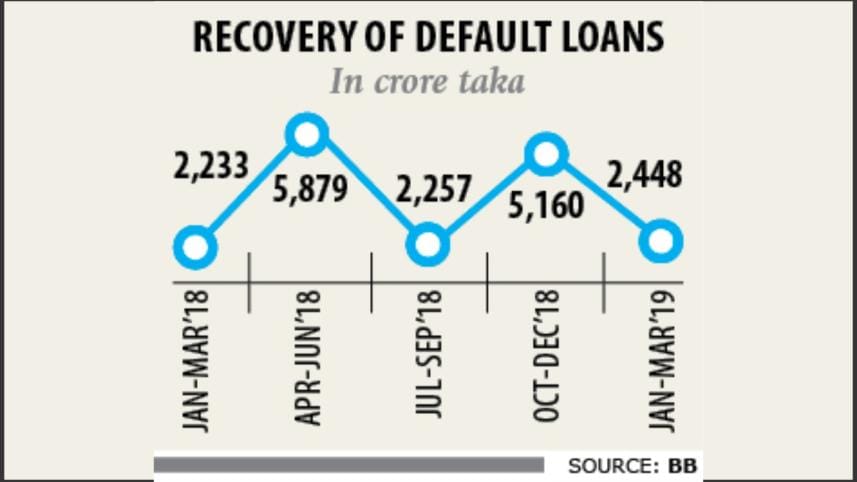Loan recovery falters in first quarter

Banks' loan recovery in the first quarter of 2019 was 9.68 percent higher than a year earlier, but given the extraordinary rate at which default loans are increasing it seems below par.
Between January and March, banks recovered Tk 2,448 crore bad loans, according to data from the Bangladesh Bank.
Typically, banks go for a strong cash recovery drive towards the year end to clean up their balance sheet and show a flattering full-year picture.
The heightened efforts leave bankers in a relaxed mood in the new year, so they take it easy with their recovery activities in the first quarter, according to Syed Mahbubur Rahman, chairman of the Association of Bankers, Bangladesh, a platform of private banks' chief executive officers.
But this year, they cannot afford to go slow given the rate at which default loans are racing ahead.
At the end of March, total default loans in the banking sector stood at Tk 110,873 crore, up 18 percent from the previous quarter and 25.15 percent from a year earlier.
The reason for the spiral is that many shunned servicing their loans after they had heard of the central bank's forthcoming rescheduling policy that had favourable terms for them, according to analysts.
As per the new policy, defaulters will be allowed to reschedule their classified loans by providing only 2 percent down payment instead of existing 10-50 percent.
A maximum of 9 percent interest rate will be charged on the rescheduled loans, which is much lower than the existing interest rate of 12-16 percent.
The tenure for repayment is 10 years with a grace period of one year, which is much longer than the existing duration for most of the loans at present.
Although the BB had announced the extraordinary facilities for defaulters in the second quarter of the year, many of the borrowers were aware of it way in advance, they said.
Besides, the insufficient recovery has also hit the ongoing liquidity crisis in the banking sector, eroding the banks' capacity to disburse fresh loans, analysts said.
"The bail-out offer for defaulters has created a moral hazard for good borrowers as they can be tempted to turn bad too," said Ahsan H Mansur, executive director of the Policy Research Institute of Bangladesh.
Against the backdrop, loan recovery will be trailing further in the days to come.
And once the grace period ends, the default loan total will rocket and the banks' feeble recovery efforts will be showed up, said Mansur, also a former economist of the International Monetary Fund.
But Rahman acknow-ledged that the recovery in the first quarter fell short of expectations as the defaulters simply resisted paying in the hope of availing the BB's new relaxed rescheduling policy.
"The liquidity base of banks would have been strong if the recovery drive got a momentum during the period," said Rahman, also the managing director of Dhaka Bank. The recovery of default loans is always a tough job and banks should continue the effort round-the-clock, said Shafiqul Alam, managing director of Jamuna Bank.
Many lenders tend to give less priority to recovery, focusing solely on business expansion. "But, they have to give the same attention to recovery and business expansion," he added.




 For all latest news, follow The Daily Star's Google News channel.
For all latest news, follow The Daily Star's Google News channel.
Comments